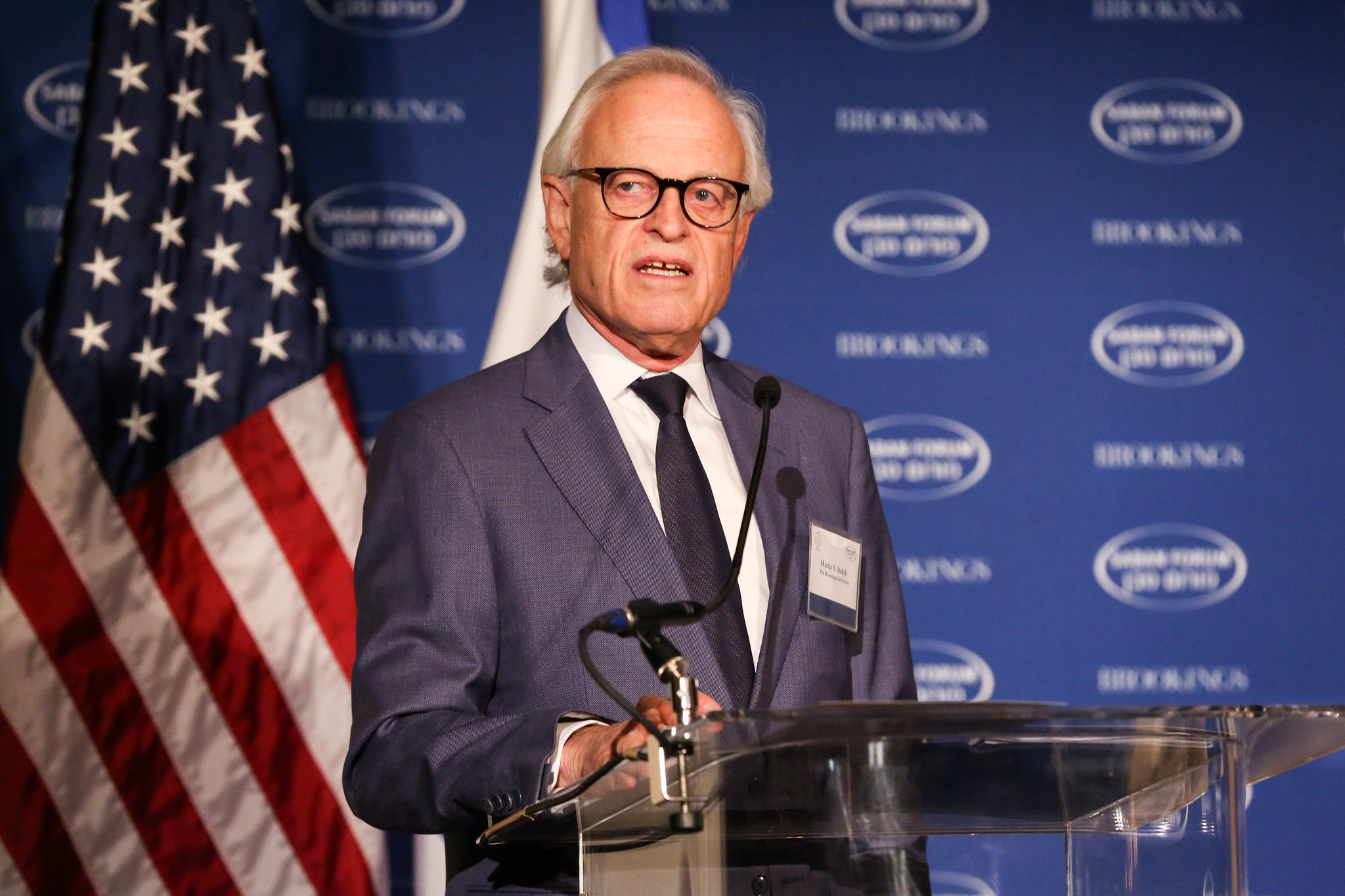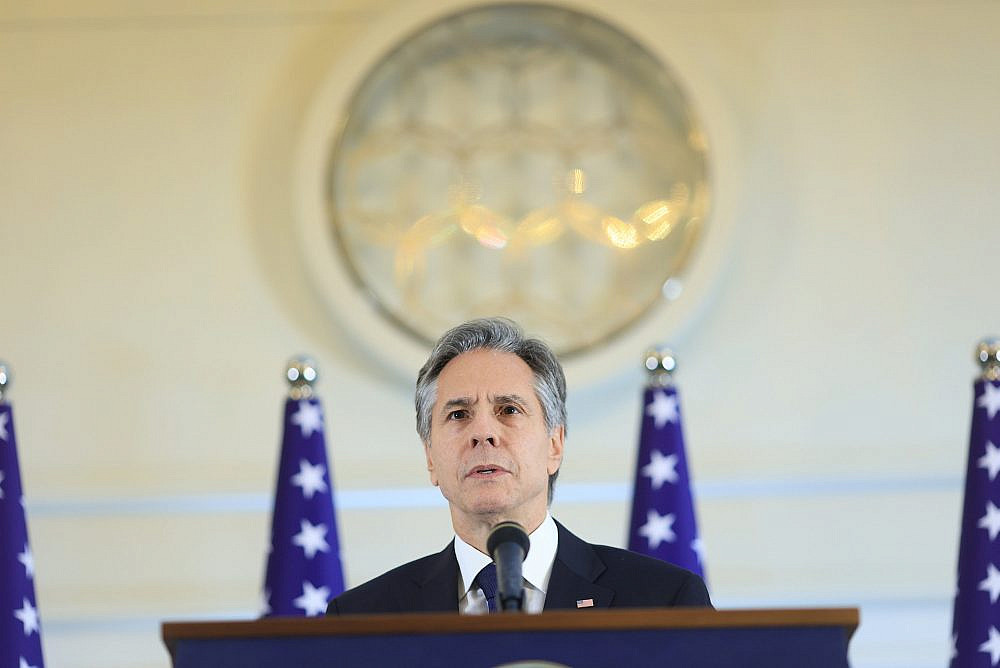For years Palestinians have warned the international community that hopes for a two-state solution were crumbling under the internal contradictions that have afflicted the so-called “peace process” since its inception. Now, it appears that mainstream policymakers may finally be catching on.
In a recent essay in the prominent journal Foreign Affairs, scholars Shibley Telhami, Michael Barnett, Marc Lynch, and Nathan J. Brown make the case that “it is no longer possible to avoid confronting a one-state reality” in Israel-Palestine. They argue that this reality, characterized by Israel’s absolute dominance, shatters the illusion of a democratic Israel as somehow distinct from the territories it occupies — an illusion that served as the foundation of international peacemaking efforts. By acknowledging the apartheid regime that prevails, the authors urge American policymakers and thinkers to recognize that it is “time to give up on the two-state solution.” (The authors have recently published an edited volume on the same subject.)
While the argument is not new, the article is an important one. Its publication in a mainstream journal, known to be widely read in American political and policy circles, has catapulted what has been a peripheral discussion onto center stage. It also comes at a pivotal moment for the Palestinian struggle for liberation, as the election of Israel’s most far-right, extremist government yet, and rising tides of violence against Palestinians, shed new light upon the one-state condition that exists between the Jordan River and the Mediterranean Sea.
Nonetheless, the essay has come under criticism from many American commentators. In an exchange on Twitter, Martin Indyk — a former U.S. ambassador to Israel and now a distinguished fellow at the Council on Foreign Relations, a leading American think tank — acknowledged the one-state reality that exists today, but took issue with what he described as the four authors’ “prescription for a U.S.-imposed binational state” (the authors stress that this is not actually what they are arguing for). “The U.S. should never give up on the two-state solution, no matter how distant it is today,” Indyk continued.
Indyk’s response is emblematic of the intransigence that afflicts much of the U.S. foreign policy establishment on Palestine-Israel. Indeed, it reflects a wider trend of pushback against efforts to recognize the failure of the so-called “peace process,” particularly by those dedicated to the preservation of the status quo of Israeli dominance — even under the guise of a two-state vision.
Disillusionment long in the making
The Foreign Affairs article is a welcome contribution to the efforts of Palestinian and allies who have spent years articulating the one-state reality on the ground. That said, the essay does not go far enough in exposing the inherent flaws of the peace process itself. Even referring to the “collapse” or “death” of the two-state solution is a misnomer; for something to collapse insinuates that it once stood in the first place. The truth is, the peace process was always aimed at consolidating Israel’s settler-colonial enterprise and entrenching its domination over Palestinians. The pursuit of two states was merely a means to this end.

From the outset of the negotiations that began at Madrid in 1991 to the signing of the Oslo Accords in 1993, it was evident that the “independent Palestinian state” envisioned by Israel and its benefactors would be independent in name only. In practice, the formalization of scattered, semi-autonomous Palestinian bantustans in less than 40 percent of the occupied territories, with Israel directly controlling 60 percent yet holding overriding authority across the land, simply facilitated Israel’s dominance without having to absorb the Palestinian population as citizens and risk its Jewish supremacy.
The only reason the Israelis agreed to sit at the negotiating table in the first place was because the Palestinians briefly wielded leverage. The First Intifada, which began in December 1987, put the Palestinian struggle for liberation on the global map, and the mass civil disobedience that characterized the uprising appeared to make the occupation untenable. Even the United States, under the Republican administration of George H.W. Bush, threatened to withhold billions of dollars in loan guarantees to Israel if it refused to entertain negotiations with the PLO.
But even for those who did buy into the fallacy that the two-state solution would lead to real Palestinian independence, disillusionment was long in the making. The unabated expansion of illegal Israeli settlements, Israel’s refusal to recognize Palestinians as a national group, the fragmentation of the territories that would hypothetically constitute a new state, and Israel’s insistence on retaining control of just about everything from freedom of movement to security, are just a few of the reasons that even the most wildly optimistic visions of a Palestinian state would ultimately fall far short of true sovereignty. The fact that much of the Oslo Accords’ structures remain in place to this day, to the detriment of Palestinian rights but to the benefit of Israeli rule, is further testament to that design.
Yet despite the mounting evidence, many people — including politicians, policymakers, and think tanks in the United States — still refuse to acknowledge the one-state reality that prevails, or to even consider alternative strategies. Their obstinacy betrays more than mere ideological differences on policy and tactics. Those who insist upon repeating the same mistakes in search of different results, and who demand Palestinians continue putting their faith in a process that has only deepened their suffering, show that they are both willfully blind to reality and, more importantly, do not consider Palestinians as equals in any future solution.
Pleading with the occupier
Martin Indyk is one of those figures. A two-time U.S. ambassador to Israel in the mid-1990s and early 2000s, and later Barack Obama’s special Middle East envoy for peace talks between Israel and the Palestinian Authority, Indyk’s resume is both extensive and revealing. After volunteering in a kibbutz in southern Israel during his youth in the 1970s, Indyk went on to work as a research director at none other than the American Israel Public Affairs Committee (AIPAC). He then became a founding executive director of the pro-Israel Washington Institute for Near East Policy, and later a senior director at the Brookings Institution.

Indyk’s continued dedication to the two-state solution, along with his staunch opposition to any alternative — particularly calls for one democratic state with equal rights for everyone — are driven by two deeply flawed arguments, shared by many in his circles.
First and foremost, Indyk is adamant that Israel must remain a “Jewish democracy,” whatever the cost. That cost is the lives of millions of Palestinians who are expected to sacrifice their full freedom and sovereignty while patiently negotiating for the same rights their occupiers take for granted. Indeed, because of the demographic reality today, in which Palestinians now marginally outnumber Jewish Israelis between the river and the sea, the choice is starker than ever: Israel can either remain an apartheid state or become a real democracy, but it cannot be both. Even Indyk recognizes this dilemma: “Once you have equal rights, it’s not a Jewish state anymore,” he told the LA Times in February.
For most people, the decision to go with democracy over apartheid should be a no-brainer. However, it is the Palestinian demand for equality — the supposed bedrock of liberal societies across the globe — that Indyk inexplicably considers a nonstarter. To the former ambassador, Israel’s right to exist as a Jewish supremacist state trumps Palestinians’ right to self-determination in their own homeland. If denying Palestinians equality allows Israel to remain a Jewish state, then so be it.
Secondly, Indyk argues that alternative solutions to the two-state model are “unrealistic” because Israeli leaders would never give up their power. “What Israeli prime minister is going to hand the keys over to the Palestinians?” he said in the same February interview.
Most read on +972
Indyk is correct that Jewish supremacists in Israel will never willingly give up the oppressive structure they have built for themselves. But nobody is expecting that to happen. In Algeria, for example, it took years of armed resistance to eventually compel the French to give up on their settler colonial fantasies. In South Africa, a concerted international campaign of boycotts, divestment, and sanctions, along with both armed struggle and civil disobedience, forced the apartheid government to realize that its racist project was unsustainable. So why does Indyk insist that Palestinians should continue pleading with their occupiers in the hopes that they will renounce their dominance out of sheer generosity?
Precluding necessary conversations
Indyk is not alone in his relegation of equality, fundamental rights, and democracy when it comes to Palestinians. Indeed, his views represent core tenets of liberal Zionism, an ideology that remains a central prism through which much of U.S. policy on Israel continues to be discussed. Other familiar policy figures who share this ideology, such as former diplomat and Washington Institute fellow Dennis Ross, have played similar roles in entrenching the status quo in American thought and practice.
It is also telling that Indyk expresses the same opposition, albeit less bluntly, as Elliott Abrams — a neoconservative diplomat who recently served under the Trump administration and was an outspoken advocate of the U.S. invasion of Iraq — who in a CFR blog post denounced the Foreign Affairs essay as a call to “eliminate” Israel. From hawkish to liberal Zionists, all are wedded to the vision of maintaining Palestinian bantustans that effectively isolate non-Jewish population centers and allow Israel to retain a Jewish majority.

Of course, there is nothing novel about this disdain for Palestinian rights. But what is particularly concerning about the strand of anti-Palestinianism embraced by the likes of Indyk and Ross, who are widely seen as “moderates” in their field, is how easy it is to miss. These figures have dedicated much of their careers to what they truly believe is a peace process; indeed, they each boast large and influential platforms, enjoy access to key policymaking circles, and have played direct roles in shaping the “special” U.S.-Israel relationship. Yet their vision of peace, consciously or subconsciously, is one that always prioritizes the rights and security of Jewish Israelis over Palestinians. How can we expect innovative and visionary ideas from those who do not even consider Palestinians as true equals?
This is not to say that one democratic state is necessarily the answer. However, in their efforts to deter us from considering alternatives to the two-state solution, figures like Indyk and Ross preclude us from collectively facing reality and having the conversations we should have been having years ago. Until they can muster up the humility to listen to what Palestinians have been saying for years — and more crucially, the courage to treat Palestinians as equals — these figures should not be considered anything other than shameless advocates of the status quo.
Moreover, in demanding Palestinians adhere to a resistance strategy that suits Israel’s interests, liberal Zionists like Indyk and Ross are effectively telling Palestinians to wait in perpetuity for a liberation that will never come — to negotiate for their rights with an oppressor that has neither a conscience nor reason to loosen its grip.
But the lessons of history are clear. During the U.S. civil rights movement, the renowned actor and leftist activist Paul Robeson called out the irony of those who insisted that the immediate realization of equal rights for Black Americans were not practical. “We must wait, we are told, until the hearts of those who persecute us have softened,” Robeson wrote in 1958. Palestinians cannot afford to wait any longer.




